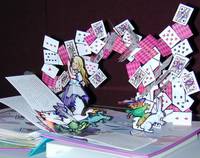We saw the pediatrician this morning jsut to make sure (my other insisted), but we have a clean enough bill of health to be travelling. We leave in the morning.
There's not much else to report.
Helena and I lazed about in bed for a bit after waking. She was looking for something to read on my bedside shelf, which happens to include some childhood favourites in addition to a couple books I expect to hold a toddler's interest. Although I advised her against it, she brings me each of the Narnia chronicles, one after the other, and settles in under the covers, anticipating a great story — I barely finish the first sentence, she takes the book from my hands saying, "Pas ça," and tries another. No, now is not the time.
I was impressed with how interested she was in Winnie-the-Pooh; after a couple sentences she went looking for her cloth edition (abridged).
A couple things I found at Bookninja and got excited over the other day:
1. Bookmarks! I love bookmarks! I have bunches! I even have this one!
2. Jasper Fforde in The Globe and Mail. Coinciding with fianlly getting my hands of The Well of Lost Plots, which I'm saving for my return. And also coinciding with the recent intrigue concerning Humpty Dumpty. The fifth in the Thursday Next series is "a police procedural focusing on the case of Humpty Dumpty's great fall":
"I thought this was terribly amusing, the idea that he is a real character," Fforde says. "I always treat my nonsense and the humour in my books straight — comedy is best served absolutely straight. That's what I liked about the Humpty Dumpty concept. He's an egg and he's fallen and is broken, we all know that from our childhoods, but I was asking more pertinent questions. Why did he fall, was it suicide, or murder? What's going on?"
Also, remind me to tell you about Bulat Okudzawa someday. (Rather, note to self: try to articulate the mass of feelings and reminiscences associated with the phenomenon of Bulat Okudzawa, not because anybody else would care, but because it could prove to be a good writing exercise as well as preserving a somewhat intangible aspect of family history.) Languor Management has made mention of him in days past and inspired me. Some people call him the Russian Bob Dylan — that may be accurate as far as political sentiment goes, but on the level of musicality and power of the poetry, I'd have to say he's more Leonard Cohen (and I say that to mean "far superior": he's not nasal and can carry a tune; you can understand what he's saying and it might even make your heart pine with some universal sentiment).
OK. I'm really going this time.








